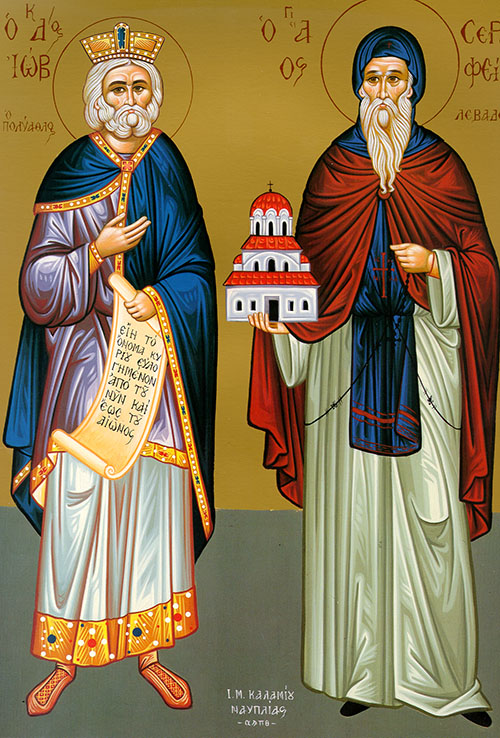

The righteous Job (whose name means “persecuted”), God’s faithful servant, was the perfect image of every virtue. The son of Zarah and Bossorha (Job 42), Job was a fifth-generation descendant of Abraham. He was a truthful, righteous, patient, and pious man who abstained from every evil thing. Job was very rich and blessed by God in all things, as was no other son of Ausis (his country, which lay between Idoumea and Arabia). However, divine condescension permitted him to be tested. Job lost his children, his wealth, his glory, and every consolation all at once. His entire body became a terrible wound covered with boils. Yet he remained steadfast and patient in the face of misfortune for seven years, always giving thanks to God. Later, God restored his former prosperity, and he had twice as much as before. Job lived for 170 years after his misfortune, completing his earthly life in 1350 BC at the age of 240.
When the enemy of the just beheld the treasures of Job’s virtues, he sought to destroy them. He attacked his body but could not touch his spirit, for his pure soul was well armed. As for us, the same enemy stripped us and chained us. Therefore, O Savior, be on our side, protect us against the devil and save us.
O faithful Job, celebrated servant of God, you were a deeply just man and God’s sincere worshiper. You gave the world a stirring lesson by your patience and long-suffering. Therefore, we sing a hymn of praise to your memory and we honor you.
Acts 8: 5-17
In those days, Philip went down to the town of Samaria and there proclaimed the Messiah. Without exception, the crowds that heard Philip and saw the miracles he performed attended closely to what he had to say. There were many who had unclean spirits, which came out shrieking loudly. Many others were paralytics or cripples, and these were cured. The rejoicing in that town rose to fever pitch.
A certain man named Simon had been practicing magic in the town and holding the Samaritans spellbound. He passed himself off as someone of great importance. People from every rank of society were paying attention to him. “He is the power of the great God,” they said. Those who followed him had been under the spell of his magic over a long period; but once they began to believe in the good news that Philip preached about the kingdom of God and the name of Jesus Christ, men and women alike accepted baptism. Even Simon believed. He was baptized like the rest and became a devoted follower of Philip. He watched the signs and the great miracles as they occurred, and was quite carried away.
When the apostles in Jerusalem heard that Samaria had accepted the word of God, they sent Peter and John to them. The two went down to these people and prayed that they might receive the Holy Spirit. It had not as yet come down upon any of them since they had only been baptized in the name of the Lord Jesus. The pair upon arriving imposed hands on them and they received the Holy Spirit.
John 6: 27-33
At that time Jesus said to the people coming to him, “You should not be working for perishable food but for food that remains unto life eternal, food which the Son of Man will give you; it is on him that God the Father has set his seal.” At this they said to him, “What must we do to perform the works of God?” Jesus replied: “This is the work of God: have faith in the One whom he sent.”
They asked him, “So that we can put faith in you, what sign are you going to perform for us to see? What is the ‘work’ you do? Our ancestors had manna to eat in the desert; according to Scripture, ‘He gave them bread from heavens to eat.’”
Jesus said to them: “I solemnly assure you, it was not Moses who gave you bread from the heavens; it is my Father who gives the real heavenly bread. God’s bread comes down from heaven and gives life to the world.”
Icon courtesy of Jack Figel, Eastern Christian Publications – ecpubs.com
Monday, May 5 –